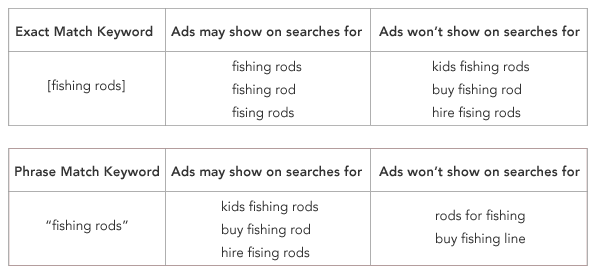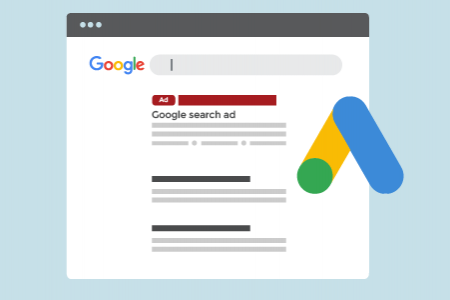We aim to respond to all messages within 1 business day. You'll be hearing from us soon!
In the meantime, perhaps you'd like to learn more...
AdWords Keywords Match Type Changes - Thanks, But No Thanks
Earlier this month Google announced an important change to the keyword matching rules for Phrase and Exact match types.
Their official word on the change states that "Starting in mid-May, phrase and exact match keywords will match close variants, including misspellings, singular/plural forms, stemmings, accents and abbreviations. Based on our research and testing, we believe these changes will be broadly beneficial for users and advertisers.”
Typically I’m quite excited by the launch of new AdWords features (the unveiling of ‘modified broad match’ springs to mind), however on this occasion my excitement rapidly turned to frustration when it became clear that all advertisers using Phrase and Exact match in their campaigns would automatically be ‘opted in’ to the new settings. Now I must point out that although all advertisers are opted in by default, it is possible to opt out manually. Nevertheless I don’t see why Google should force its advertisers into adopting the new rules by default – surely a voluntary ‘opt in’ approach would have been better.
Phrase/Exact match changes (in a nutshell…)
Before going further let’s take a really quick look at the changes. From mid-May Google will be able to show your ad when a user searchers for close variants of your Exact match and Phrase match keywords, essentially broadening the reach of your existing Phrase and Exact match keywords. Confused? Check out the table below for an example of how the new rules work in practice.

So, why my frustration?
At the risk of sounding like a control freak my chief concern is that by implementing these changes Google is diluting the level of control I expect when using Phrase and Exact match. Sure, opting out is no big deal and in doing so I can regain the level of control I held previously, but I’d bet that a good proportion of AdWords advertisers either won’t fully understand the impact of these changes, or won’t even know they’ve taken place. Although the changes have yet to be launched, I’m taking some small degree of comfort in the knowledge that Im not the only one with an axe to grind.
Some quick research revealed two broad schools of thought on this subject. The first suggests that the change will make campaign management easier because you'll no longer need to worry so much about carefully planning and organising your campaign to cater for singular vs plural keywords and misspellings etc. The other viewpoint (generally held by AdWords advertisers who take great care to craft well-structured and highly granular AdWords campaigns), is that in order to achieve real success with AdWords you need precise control over which search queries trigger your ads to show; something that is achieved by catering to misspellings, singular and plural keyword variations etc in the creation and management of a successful AdWords campaign.
After almost 10 years of managing pay-per-click campaigns across a variety of platforms I feel I can safely say I fall into the second category. And while I can certainly empathise with advertisers who find the AdWords advertising platform a complex beast and are happy for any automation they can get, I still fail to see how giving Google more control can be a good thing.
In my experience I can recall very few campaigns I've managed that would benefit from letting Google take care of the heavy lifting by matching plurals, singulars and abbreviations for my Exact match keywords. It’s probable that AdWords managers that do remain opted in to the new rules are either doing it to save time and possibly prescribe to the ‘set and forget’ school of campaign management (or lack of), or perhaps they’re doing it out of laziness. Either way, the end result is likely to be higher costs per click for their clients – something that will please Google given recent reports that Google’s AdWords revenue is down for the second quarter in a row.
What approach will we be taking?
For now it’s safe to say we'll be opting out of the new Phrase and Exact match settings until such time as we see real evidence of the improvements the new feature is purported to deliver. Of course we'll assess every situation on its own merits, and I’m prepared to be proven wrong here, but if these latest changes are anything like the other ‘performance enhancing’ settings they’ve released over time (‘enhanced CPC bidding’ anyone?) then for now I’m more than comfortable with our decision to opt out and maintain a higher degree of control for our clients.
Thankfully, opting out is relatively easy - go to the ‘Advanced Settings’ section of your campaign and ensure that you tick the ‘Do not include close variants’ radio button in the ‘Keyword matching options’ field.

I'd love to hear your thoughts about the changes - like/dislike them/not fussed either way? Where you aware they’re taking place, and more importantly, do you understand the impact they’re likely to have on your campaigns? Drop a comment below.
Written by Mark Vassiliou
Mark is the Manager of Digital Marketing at Apex and has worked in the digital marketing industry since 2004. Prior to joining Apex he worked in a variety of traditional marketing roles in both the corporate and SME environment in NZ and abroad, but these days much prefers the tangible measurability and transparency of digital marketing.Related posts
AWESOME! LET'S GET STARTED
TELL US HOW WE CAN HELP
We aim to respond to all messages within 1 business day. You'll be hearing from us soon!
In the meantime, perhaps you'd like to learn more...






